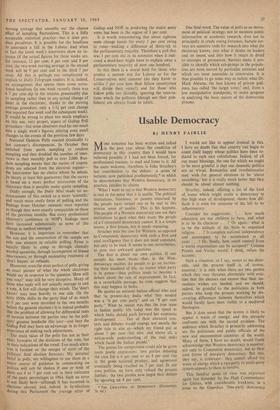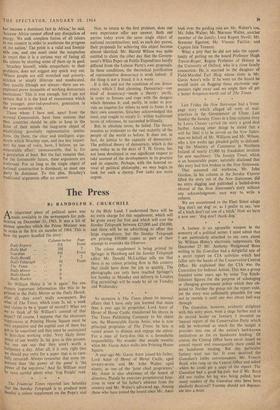Usable Democracy
By HENRY FAIRLIE MORE nonsense has been written and talked in the past year about the condition of democracy in this country than I would have
believed possible if I had not been forced, for professional reasons, to read and listen to it. All the more welcome, therefore, is John Strachey's last contribution to the debate: a series of lectures, now published posthumously,* in which he demonstrates that Western democracy, in its practice, justifies its claims.
`What I want to say is that Western democracy is real in the sense that it is usable. The political institutions, freedoms, or powers exercised by the people have turned out to be real in this precise sense of usable.' This is his keynote.
The people of a Western democracy can use their institutions to gain what they want; the people of a Communist democracy cannot. It is a simple lesson, a first lesson, but it needs repeating.
Strachey puts the case for Western, as opposed to Communist, democracy with such a firm and cool intelligence that it does not need comment, but only to be read. It seems to me, nevertheless, to pose two awkward questions. The first is about our own politics. If one accepts his main thesis—that, in the West, democracy enables the people to go on increas- ing their standard of life, no matter what party is in power—then politics tends to become a debate about the rate of improvement. In fact, in a remarkable passage, he even suggests that this may happen in India.
He quotes an eminent Indian official who said that 'in present-day India what they needed was a "6 per cent party" and an "8 per cent party." What he meant was that the true issue in Indian public life today was the speed at which India should push forward her economic development. . . . Out of their electoral con- tests and debates would emerge not merely the right rate to aim at—which my friend put at about 7 per cent—but also, and above all, a nation-wide understanding of the real tasks which faced the Indian people.'
The genius for compromise could not be given more poetic expression : two parties debating the case for a 6 per cent or an 8 per cent rise in the gross national product, and agreement eventually being reached on 7 per cent. In our own politics, we have only refined the process further: the two parties now begin their debate by agreeing on 4 per cent.
• THE CHALLENGE OF DEMOCRACY. (Encounter,
3s. 6d.) I would not like to appear ironical in this. I have no doubt that that country can begin to count itself happy whose politics have been re- duced to such nice calculations. Indeed, of all our many blessings, the one for which we ought to be most grateful is that our domestic politics are so trivial. Romantics and revolutionaries may wish for general elections to be 'about something,' but it is really much better that they should be about almost nothing.
Strachey, indeed, offering a list of the kind of issues which might excite a democracy in this high state of development, shows how dif- ficult it is even for someone of the left to be inflammatory.
Consider his suggestions: `. . how much education are our children to have, and what is to be its character . . .? Or again: what is to be the attitude of the State to organised religion . . .? Is complete national independence and sovereignty to be maintained at all costs . . .? Or, finally, how much control from a world organisation can be accepted?' Colman Prentis and Varley would, I think, refuse the account.
Such a situation, as 1 say, seems to me desir- able, and the process itself is, of course, essential: it is only when there are two parties which they may threaten alternately with .evic- tion that the electors can ensure that their im- mediate wishes are heeded, and we should, indeed, be grateful to the politicians in both parties who keep the process working by dis- covering differences between themselves which would hardly have been visible to a mediaeval theologian.
But it does mean that the system is likely to appear a waste of energy; and this abruptly confronts one with the second problem. The audience which Strachey is primarily addressing are the politicians and public officials of the new and uncommitted countries of the world. Many of them, I have no doubt, would freely acknowledge that Western democracy is superior, not only to Communist democracy, but to their own forms of one-party democracy. But this, they say, is irrelevant : they cannot afford the waste of energy which a two-party or multi-party system.appears to them to involve.
This familiar point of view was expressed again last Saturday by the High Commissioner for Ghana, with considerable frankness, in a letter to the Guardian. 'One-party democracy
has become a dominant fact in Africa,' he said, 'because Africa cannot afford any dissipation of energy. We seek complete fusion of all talents in our country in order to accelerate the progress of the nation.' The point is a valid and formid- able one, and one must resist the temptation to retort that it is a curious way of fusing all the talents by shutting some of them up in gaol.
Strachey himself, while sympathetic to their problems, does not suggest any quick way out. 'Where people are still wretched and poverty- stricken or simply illiterate and uneducated, they usually (though not always—there are ex- ceptions) prove incapable of working democratic institutions.' This is true enough, but I am not certain that it is the kind of reassurance which the younger, post-independence, generation in the new countries wish.
Those whom I have met, apart from the avowed Communists, have been anxious that their countries should be able to keep in the front of their minds the long-term object of establishing genuinely representative institu- tions. On them, the clear and intelligent argu- ments which Strachey uses, and (no less import- ant) his tone of voice, have, I belieye, an im- measurable effect: immeasurable, that is, for a generation at least. But the fact remains that, for the foreseeable future, these arguments are irrelevant. For so long as the single object of national construction is dominant, so must one Party be dominant. To this plea, Strachey's traditional arguments offer no answer. Nor, to return to the first problem, does our own experience offer any answer. Both our parties today avow the same single object of national reconstruction; and, as each day passes, their proposals for achieving this object become almost identical. Mr. Harold Wilson was quite entitled to claim the other day that the Govern- ment's White Paper on Public Expenditure hardly differed from the Labour Party's own proposals. In these conditions, the theoretical justification of representative democracy is weak indeed : if the thing is not a fraud, it is a waste.
It is this, and not the condition of our demo- cracy, which I find alarming. Democracy—our kind of democracy—needs a theory: partly, in order to foresee and cope with the dangers which threaten it; and, partly, in order to pro- vide an impetus for others to seek to foster it in their own countries. Strachey acknowledged this need, and sought to supply it: within traditional terms of reference, he succeeded brilliantly.
But, in absolute terms, he failed. The theory remains as irrelevant to the vast majority of the people of the world as before. It does not, in fact, do justice to the capacity of democracy. The political theory of democracy, which is the same today as in the days of T. H. Green, has not been developed in one significant respect to take account of the developments in its practice and its capacity. Perhaps, with the boasted re- vival of political philosophy, we may begin to look for such a theory. Few tasks are more urgent.



































 Previous page
Previous page